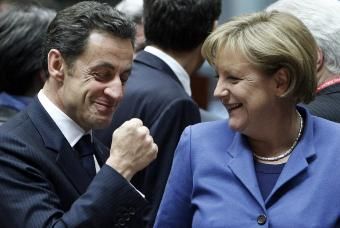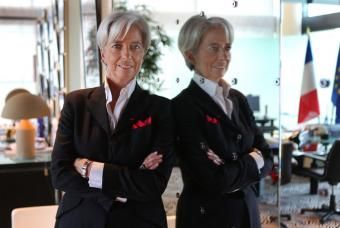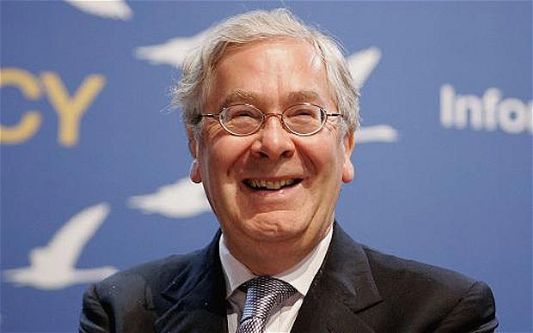Our old friend George Soros (See post 004 – Short Selling), the Hungarian investor / currency speculator of Black Wednesday notoriety, has appeared in Newsweek and given his frank assessment of the current financial situation. To say he paints the outlook as a bit bleak is to understate it spectacularly:
"The euro must survive because the alternative – a break-up – would cause a meltdown that Europe, the world, can't afford. I'm not here to cheer you up. The situation is about as serious and difficult as I've known in my career. We are facing now a general retrenchment in the developed world. The best-case scenario is a deflationary environment. The worst-case scenario is a collapse of the financial system. We need to move from the Age of Reason to the Age of Fallibility in order to have a proper understanding of the problems."

George Soros - probably won´t be doing the Edinburgh Fringe anytime soon.
He wasn´t the only one articulating concern. Christine Lagarde, the French, 6ft tall, silver-haired Director of the International Monetary Fund has also been upping the ante of late, warning us that unless we throw more good money after bad "we could easily slide into a 1930s moment. A moment where trust and cooperation break down and countries turn inward. A moment, ultimately, leading to a downward spiral that could engulf the entire world."
She´s joined the ranks of Sarkozy, Merkel and Van Rompuy, all of whom have adopted this infuriating tendency of implying the continent is going to be plunged into a violent and bloody war which can only be avoided if a) the UK agrees to a new financial transaction tax, b) the combined peoples of the EU agree to a retirement age of 89, c) we continue to prop up failed financial entities with taxpayer money. I really am starting to get a little annoyed with the bellicose rhetoric that is increasingly becoming par for the course. There´s not a shred of evidence to show that a sovereign default by any EU nation would result in war.

"My fist... Cameron´s face" chortles the pint-sized Sarkozy, showing off.
It’s hard to believe now, but there once existed a time when you could listen to an entire news bulletin and not hear the IMF mentioned once. In fact whole weeks could lazily roll by without a single growth forecast being revised down or an inflation projection being revised up. Occasionally on the breakfast news you´d hear of some corrupt and crumbling Latin American or African regime, in the throes of hyper-inflation, that was looking for IMF help, but it was a minor concern and completely forgotten about by the time you´d finished your cornflakes. But then came sub-prime, then Lehman, and suddenly Dominique Strauss-Kahn was in my front room more than I was.
Given the organization’s high profile, and with its fingers in pies in Ireland, Greece, Portugal, Ukraine, Hungary, Serbia… in total some 70 nations, I thought it an opportune moment for us to have a closer look at where it came from, what its role is and how it’s funded. Let´s begin at the beginning:
In 1944, representatives from the 45 Allied nations convened in the New Hampshire town of Bretton Woods, US of A, with the objective of preparing a framework for international economic cooperation which would be implemented once peace had been restored to the planet post WWII. The impetus for this new synergistic and open approach to global trade, exchange rates and cross border payments was a desire to avoid a repetition of the 1930’s “Great Depression” the cause of which was allotted to countries raising trade barriers, devaluing their currencies in an export war and in some cases even prohibiting their citizens from holding foreign currency.
The IMF´s own website states that “The International Monetary Fund (IMF) is an organization of 187 countries, working to foster global monetary cooperation, secure financial stability, facilitate international trade, promote high employment and sustainable economic growth, and reduce poverty around the world.” Now I don´t know to what extent the IMF feels it is achieving those lofty objectives of financial stability, sustained growth and high employment, but a quick glance at the Spanish press would suggest to me it really wants to be awarding itself an “E” in this year’s annual self-assessment.
The website goes on to explain ; “One of the IMF's most important jobs is to conduct an annual "checkup" of the economy of almost all the IMF's member countries. These checkups help uncover issues in a country's economy that other member countries may be unaware of. Sharing accurate, objective information avoids nasty surprises in international trade and monetary exchange. The IMF's reputation and success depends on this open sharing of information. “

Christine Lagarde and her twin sister. Christine parts her hair on the left.
I'm not a fan of the IMF but to be fair to it, it can do all the scrutinizing and account checking that it likes, but it doesn't have the jurisdiction to implement economic policy within a sovereign nation’s borders. It can make recommendations but if its advice goes largely unheeded it can hardly be held responsible for the ensuing chaos.
The IMF is funded by its member nations which pay quotas based on their wealth. The richer a country is, the bigger share it pays, and the more it pays, the more voting rights it is awarded. As you might expect, the US is the largest contributor and as such has over 16% of the votes. However this system led to same strange anomalies recently. For example, Spain and Italy were (and still are) getting hammered in the sovereign bond markets, paying 5, 6, 7% yields on their debt, and yet they were then paying their quota to the IMF, who in turn lent the money to Greece, who paid just 3.3% interest back to the IMF. It was nonsense; borrowing money at 6% to lend it at half that rate. Italy was tapped for its 12.6 billion dollar contribution and the way things are carrying on there, it could effectively be contributing to its own bail-out fund.
Another charge levelled at the IMF is that much of the work it does is cloaked in secrecy. It will insist on certain policies being implemented in states that it has agreed to support, but neglects to inform what or who guides its decision making process . There’s no public debate. It demands transparency from its member states and yet completely lacks transparency itself.
But by far the most damning criticism of the IMF is that it frequently makes a bad situation worse. Despite the humanitarian and charitable feel to its propaganda, it often stands accused of destroying nations by demanding the ruthless implementation of crippling austerity measures in return for access to emergency finance. It is far more concerned with its loan repayments than it is with education, sanitation, health – services which it often insists are slashed as part of an assistance agreement. It suffocates any hope of growth by demanding budgets are cut, public sector workers are fired and taxes are hiked up. It squeezes the economy to such an extent that far from attracting new investment, existing business flees, thus creating even higher unemployment and further socio-economic distress.

Sir Merv King - Don't worry, be happy.
However, my favourite quote yesterday came from Sir Mervyn King, Governor of the Bank of England. He wasn´t having any of this “Lights out In Europe”, “The Planet on the Brink” clap-trap. He calmly said “There´s no reason to despair, all crises come to an end…” and then I like to imagine he made himself a pot of tea and settled down with a Bill Bryson book by the fireplace. And on that reassuring note, I´m off to enjoy my lunch and look forward to the last installment Of Downton Abbey this evening. Enjoy the rest of your day!
P.S. I´ve left a few links today for anyone who wants to read a bit more about the IMF. I´ve no doubt at all that we´ll be coming back to this organization again and again over the coming months and years, it really is worth reading up on how it operates. The interview with Nobel-laureate economist Joseph Stiglitz is interesting, although the bright blue page background should carry a health warning.
http://www.thirdworldtraveler.com/IMF_WB/HospMakesYouSick_IMF.html
http://www.thedailybeast.com/newsweek/2011/07/10/amar-bhide-and-edmund-phelps-on-what-s-wrong-with-the-imf.html